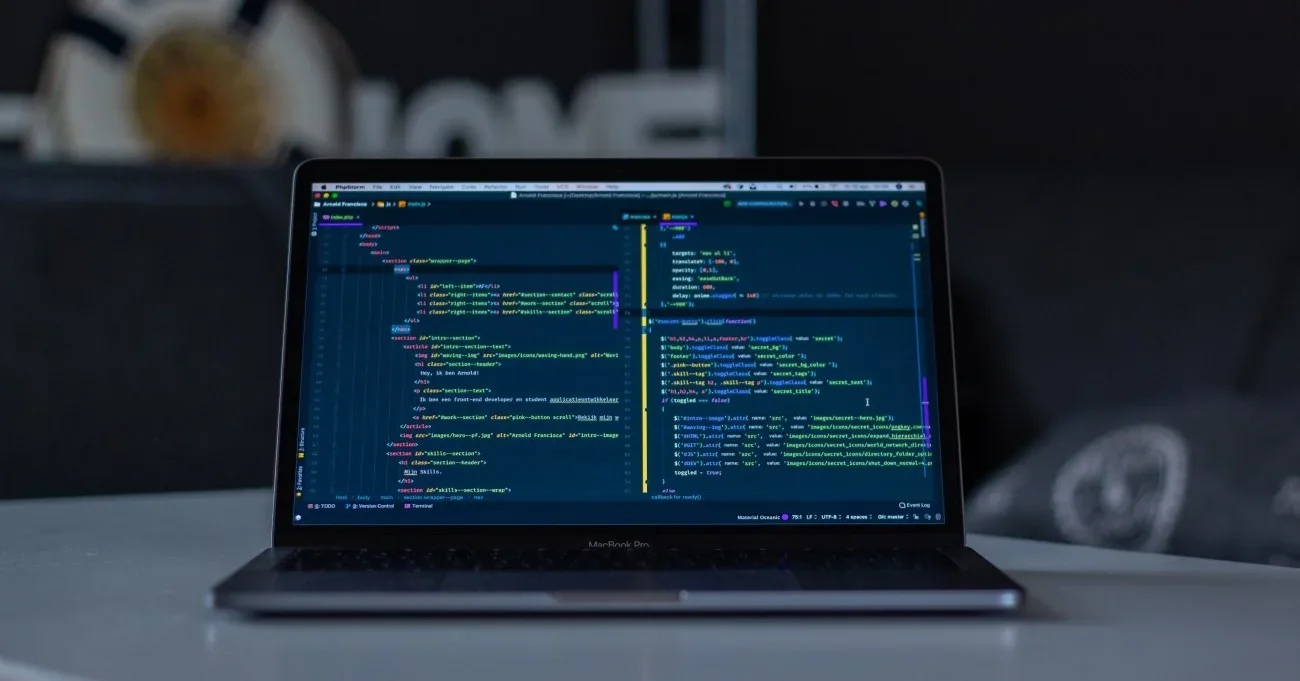We've all heard of Python, the programming language used for everything from website development to machine learning. But really, why Python? What makes it special and valuable that more programmers and developers are choosing to learn this language?
For many, Python might sound like a challenging tool, and only coding professionals use it. Surprisingly, many non-programmers like data scientists and accountants also use Python to perform everyday tasks, like managing finances and sorting data. Python creates more room for creativity in solving problems and making a living while having fun.
In this post, we'll discuss the top 10 reasons that make Python a popular programming language for programmers and non-programmers worldwide. You will have a clear understanding of its advantages at the end of this read, as well as how you may leverage its diversity and adaptability to benefit your project.
What Is Python?
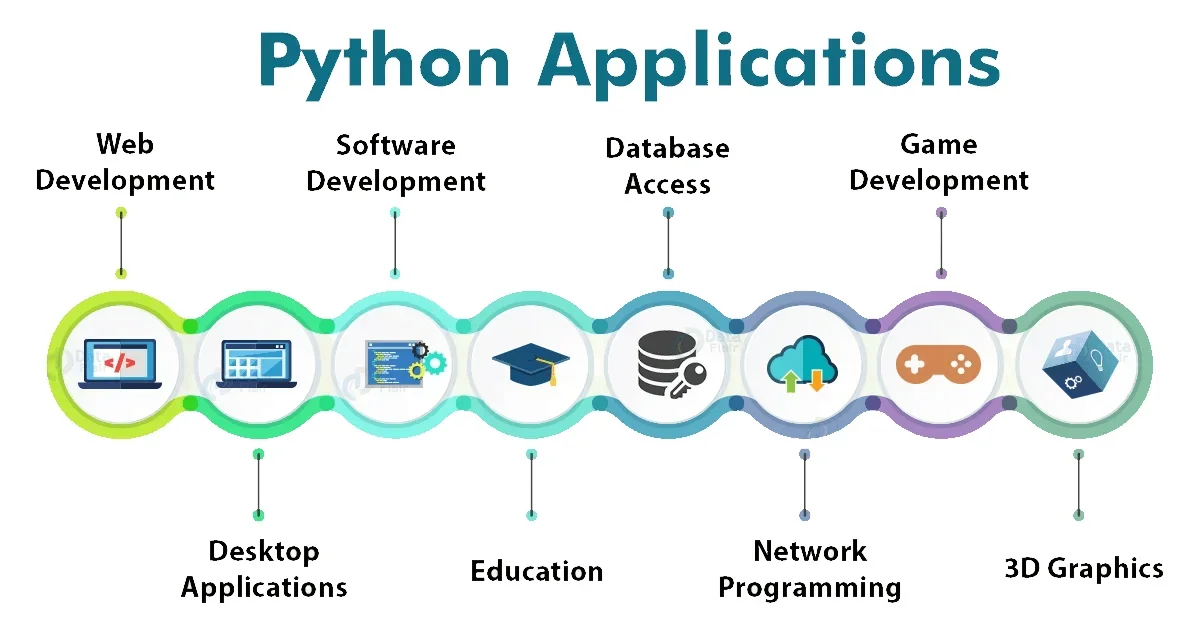
Python is a general-purpose programming language created by Guido van Rossum in the 1980s. It is incredibly versatile, flexible, and beginner-friendly; hence is 2023’s most popular programming language worldwide.
Python is the most popular yet easiest programming language to learn. In addition to a big pool of job opportunities across different industries and roles, it has a robust community and mature resources available. In June 2023, Python beat C to be the top programming language in the PYPL and TIOBE index.
Instead of solving specific problems, Python is meant for a broad range of applications, including:
- Automation
- Data Science
- Data Analytics
- Web development
- Software development
Even the renowned Netflix uses Python for its recommendation algorithm to publish the movies that match your desire the most.
Python codes can be created quickly and perform faster than many other programming languages. Since it is an interpreted language, one can modify it quickly for experiments and achieve desired results in a shorter time.
Fun Fact:
Guido van Rossum was reading the BBC's Monty Python's Flying Circus when developing Python. He named this language after Python, where he thinks the length is just right with a subtle mystery.
Python Language Over The Years
Python is an open-source programming language that is free to use and distribute. Many developers worldwide utilized it to create GUI applications and web applications with fewer, easily readable codes. Building large and complicated software applications is much faster with lesser time.
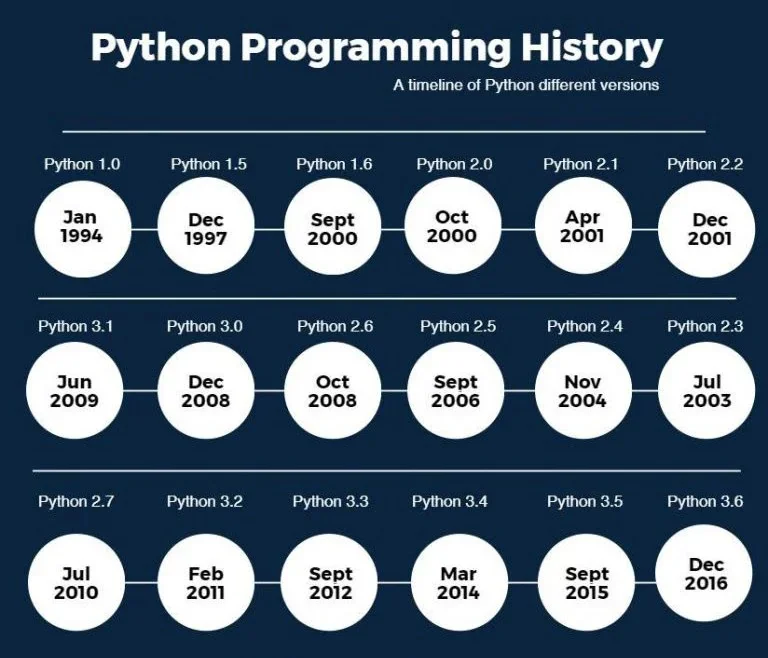
Today, nearly 70% of software developers who use Python expressed a desire to continue to work with Python development. Most developers who are not using Python currently also rate it as the most in-demand language. Its popularity has risen tremendously over the past three decades and is likely to increase further in the coming years.
Python has wowed many for gaming, scientific, financial, or educational purposes. While Python 3 is significantly less popular, Python 2 is used by many websites all over the world. Therefore, developers should learn different versions of Pythons to generate excellent outcomes.
Here at Aloa, we put our developers under a vigorous vetting process to examine their skills and experience in Python. Finding a quality Python developer takes work. And to ease things for you, we keep a pool of ready-to-work developers to make your recruitment process more manageable.
Now that we have a solid understanding of Python and its evolution over the years, let's discuss some of the elements that have contributed to its immense popularity.
10 Reasons Why Python Is So Popular
Despite its fewer acknowledged flaws, Python is appraised as the most important and popular programming language worldwide. Let's take a closer look at the top reasons that make Python famous, and why you should consider hiring Python programmers to develop your applications.
1. Ease Of Learning And Use
Python is a beginner-friendly programming language that is effortless to learn and use, even for those without experience. Many find it handy for its simplified English-like syntax that emphasizes instinctive languages, ensuring an easy learning curve for everyone.
Python coding is easy to write and you can implement them faster than other leading programming languages like Javascript. In fact, it is designed to be a general-purpose language, and for the majority of developers, it is advised that they learn it first.
The basics usually take newbies two to six months to grasp, but once you do, you can construct a simple program in a matter of minutes. Depending on your goals, whether you are an application developer or data analyst, you should expect to take months or years to get expertise. In particular, if your work involves data extraction from the web, understanding how to use the best Python libraries for web scraping like BeautifulSoup and Scrapy, could add immense value to your skill set. Other aspects like your prior programming experience, learning style, and time commitment are also important.
There are proven cases where self-taught developers built their Python coding skills by reading online tutorials and watching YouTube videos. With more online courses available today, you get to follow a more structured and transparent learning path at your convenience.
2. Versatile Programming Language
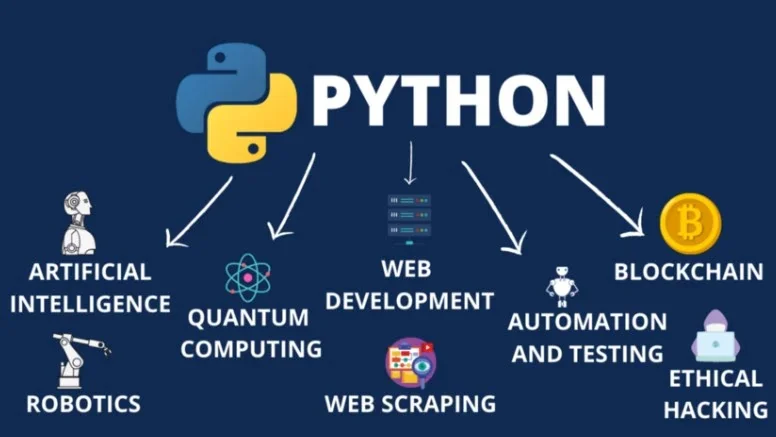
Python is also known for its versatility, allowing you to use it for numerous tasks. Let's discover the use cases for Python further.
2.1 Data Visualization And Machine Learning
You can use Python to visualize data in bar and line graphs, histograms, and pie charts. Besides, you can use Python libraries like TensorFlow to manage machine learning more effectively and efficiently.
2.2 Statistical Analysis
Python helps conduct complicated statistical calculations so you can save more time and hassles manipulating and analyzing them.
2.3 Website And Software Development
Whether you need to connect the front end and back end of a website, send information to and from servers, store data, or deal with databases, Python is the answer to all your woes. It has a wide variety of website and software development frameworks, including Django and Flask, to fit your needs.
2.4 Task Automation And Scripting
Python is especially useful when you need to automate or script repeated tasks to boost efficiency. With Python, you can speed up various tasks, including
- Error checking
- File conversion
- Sending emails
- Finding content online
- Removal of data redundancy
- Basic mathematical calculation
2.5 Software Testing And Prototyping
Software developers can manage software testing easier via Python automation tools like Requestium and Green. It helps handle control building, bug tracking, defect reporting, and testing.
2.6 Everyday Tasks
Non-programmers like social media managers and journalists could also benefit from Python to make their daily lives easier. Python can be used to automate tasks like updating procurement lists, transferring data from text files to spreadsheets, and monitoring stock market prices.
3. Matured Community
There are 8.2 million Python developers in the world, far more than any other programming language. That means you're not alone in the Python-coding journey. There's a robust community at your back to support you throughout the adventure.
You learn faster when you surround yourself with others who know Python instead of learning it by yourself. The mature and supportive community can give you more encouragement and motivation to help you achieve your goal faster.
Additionally, most of them are willing to share their helpful experience, solutions, tips, and tricks when you post your Python-related issues on the community forums and blogs.
You can look for support on social networks and channels with a lot of active Python developers, regardless of your level of Python proficiency. It includes:
- Quora
- GitHub
- Python Discord
- PySlackers or Stack Overflow on Slack
Aside from the online community, consider looking for offline courses and boot camps to boost your Python skills to an expert level in a short time. With the help of hundreds of knowledgeable and experienced developers, one with community support will undoubtedly develop more quickly than one without it.
4. Libraries And Frameworks
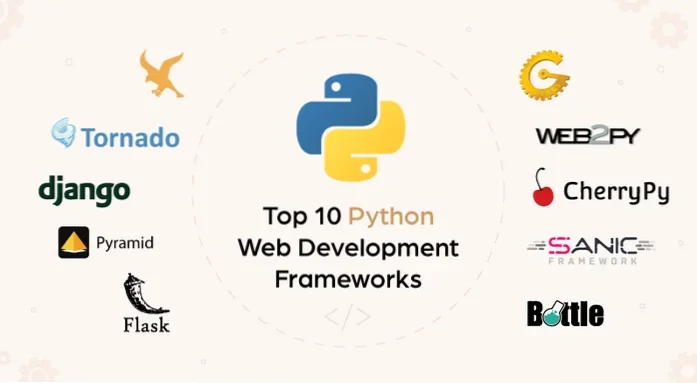
Python is free, and you can always access a vast ecosystem of resources, packages, and libraries. There are thousands of useful libraries to make your coding journey smoother and easier.
But are all Python resources essential to software development? The answer is yes.
No developer can go far with basic programming language knowledge and a code editor. The purpose of programming is not to build everything from ground zero; instead, you develop on top of pre-developed components, which are libraries and frameworks, in this case, to create more possibilities.
Examples of common Python frameworks and libraries are:
- SciPy
- Django
- NumPy
- Matplotlib
- BeautifulSoup
Different libraries and frameworks have varying functions. For instance, NumPy is for performing mathematical calculations on arrays and matrices to enhance efficiency. Whereas Matplotlib is for data visualization, and SciPy is for algorithm building.
You can even use the Django website framework to develop the entire website or BeautifulSoup to efficiently extract HTML and XML files from websites and the internet.
5. Compatibility With The IoT
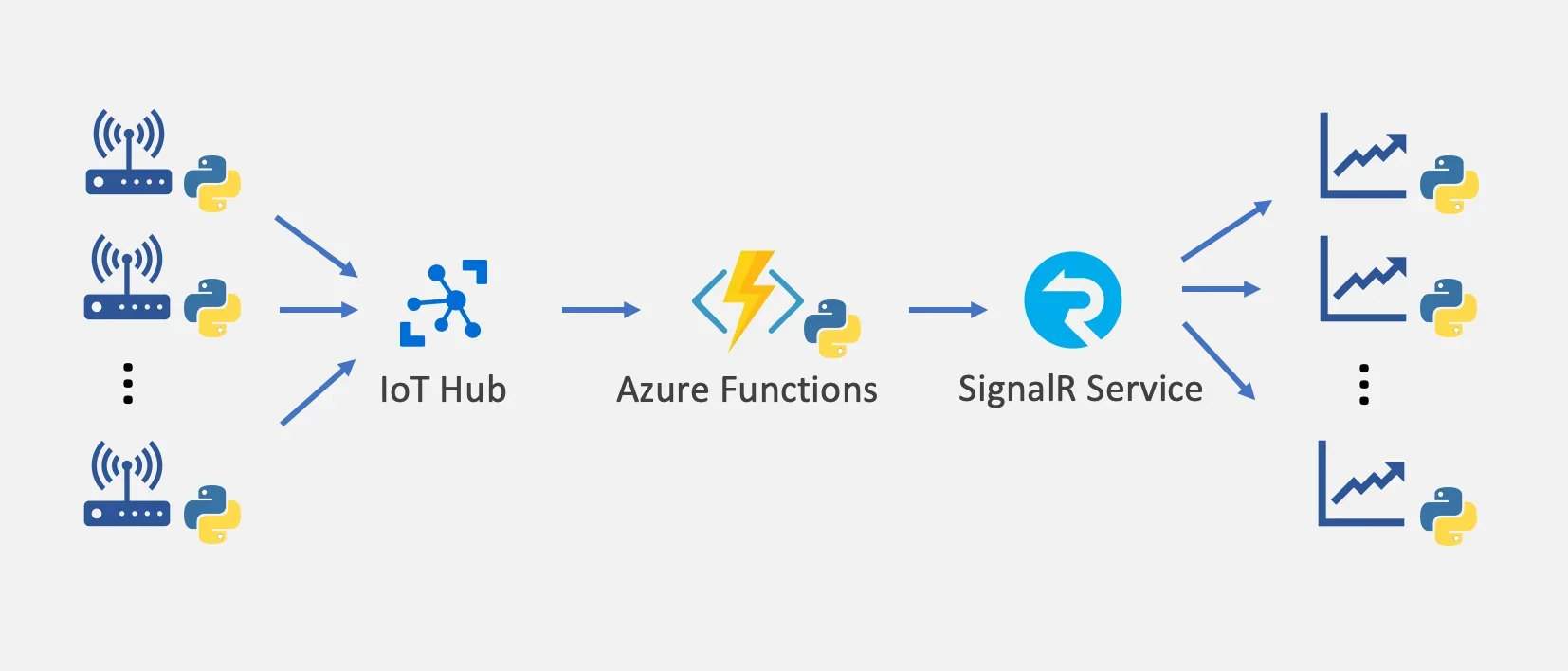
IoT (Internet of Things) is the vast network of linked devices and technology that allows communication between devices and the cloud. Some famous IoT examples are:
- Smart Homes
- Connected Cars
- Activity Trackers
- Augmented Reality
- Wearable Technology
With such diversified applications, it can be convenient yet challenging at the same time to ensure functionality and security in the IoT. Python came in just right as a friendly tool for novice and experienced programmers to work on complicated website and software development projects.
Its applications go much beyond that, with many people using Python for deep learning, cloud computing, big data, machine learning, and artificial intelligence.
In terms of statistical computation and data visualization, Python is the second-most popular tool after the R language, making it an excellent choice for data analysis and data science for better system upgrades.
According to Python developers, it is the only language used in the majority of data processing tasks today, and it is more than sufficient to ensure flawless operation.
Python and its connected IoT libraries allow developers to control all communications within devices and the cloud. Sending and receiving data is made easier and in case of limited capabilities, MicroPython comes in handy to work with specific IoT devices to save resources while providing the same benefits as Python.
6. Advance Automation Capabilities
With Python and its extensive libraries and modules, writing automation scripts no longer requires a lot of time and effort. Both Python and non-Python developers now use it as the industry standard for automation.
By employing particular Python coding, you can achieve an experienced degree of automation thanks to the range of Python tools and modules. When you are proficient in Python coding, the coding process is also sped up and requires fewer lines of code.
Here are some Python automation ideas you can utilize for more intuitive daily tasks and easier programming jobs:
- Converting image files
- Downloading content online
- Working on quick calculations
- Calculating currency exchange rates
- Sorting, sending, and replying to emails
- Filling out online forms and spreadsheets
7. Academically In-Demand Language
Python is now a high-demand programming language course both online and offline for its massive applications in computer science skills. Colleges and universities have included Python language as an introductory course to software development and programming. Additionally, it is advised that beginners start out by learning this programming language.
Learning easy and versatile Python allows you to solve various everyday tasks and have more career progression chances. There are several foundational elements and syntax you can expect in learning Python, including:
- Functions
- Web Scraping
- Variables and types
- For and while loops
- Indexing and slicing
- Classes and objects
- Comparison operators
- Lists, dictionaries, and tuples
- Application programming interfaces (APIs)
- Object and data structures (integers, floats, etc.)
8. Preferred Language Of Tech Giants

Python is made even more trustworthy by the fact that it is used by tech giants like Google and Netflix. Even companies like Uber and Dropbox also use Python for more structural programs. Let's look at Python’s utility in these firms:
- Netflix utilizes Python to recommend TV shows based on the user's watch history.
- Instagram gives users a more unique and personalized explore section using Python.
- Spotify enhances its user experience by creating personalized music recommendation lists using Python.
- Google has improved its search engine functionality with the help of a Python course created for aspiring developers.
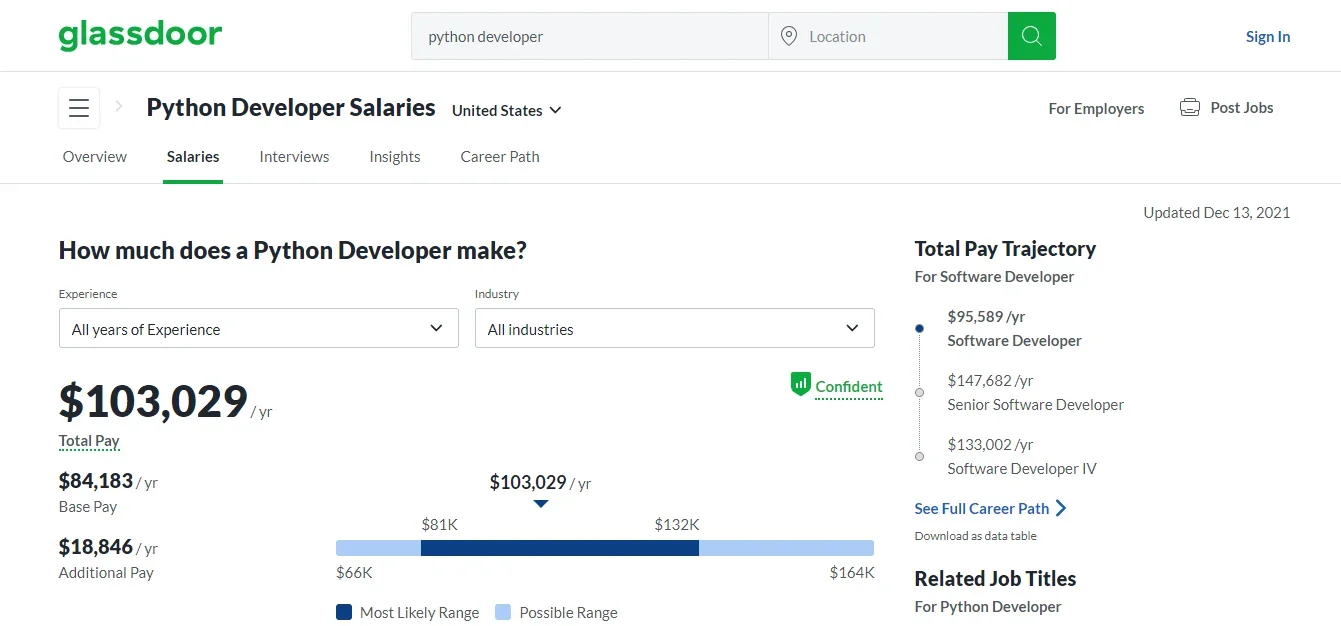
You also have career opportunities in several areas as more tech-savvy businesses use Python. There is a wide variety of job offerings and roles for Python developers with salaries ranging from $66,000 to $164,000 in the US.
9. Backed By Corporate Support
Only with extensive financial and technical assistance from commercial and governmental groups can any software, including programming languages, advance quickly. Python has become Facebook, Amazon Web Service, and Google's preferred programming language. Over the years, Python has received excellent support from these IT firms.
A Python Software Foundation was developed to promote, protect, and advance this programming language. The objective is to foster and assist in the expansion of a varied community of Python programmers worldwide.
We can tell that Python is getting a variety of support based on the efforts mentioned above. It makes sense why the popularity and usefulness of this language are expanding at a breakneck pace.
10. Offers Greater Freedom
The Python programming language is regarded by many as being more effective, quick, and dependable than most languages. You need not be a technowizard to master Python. It is more about breaking down problems and solving them with creativity and analytical skills.
Desktop applications, mobile apps, hardware programming, software development, website development – you name it – Python can be used in practically every context and platform without experiencing performance issues.
Additionally, Python, which has numerous practical applications including data management and analysis, is the foundation of the majority of research and development platforms.
Learning Python entails experimenting with new ideas while using your creativity. In fact, Python is not limited to just developing a specific software or application. You get the freedom and flexibility you can hardly find in any other programming language.
Conclusion
This article should have left you with little to no doubt as to why Python, an interpreted, object-oriented, and high-level programming language is growing in popularity.
This language is backed by a large group of helpful communities and supported by big tech companies like Meta and Google. Its versatility and flexibility based on simple syntax have made it extremely easy to learn and use. You can use it to support functional and procedural programming styles for your company's needs.
Aloa has you covered in recruiting specialized Python developers to help build your software and websites. We hire only top-notch Python developers who adhere to strict specifications to help create excellent online projects for your company.
Our Python professionals have years of expertise and experience to kickstart your project as soon as today while keeping your website and software development project hassle-free and effortless so that you can grow your business online with minimal effort.
Reach out to us today at [email protected] to discover more of our comprehensive development services.

